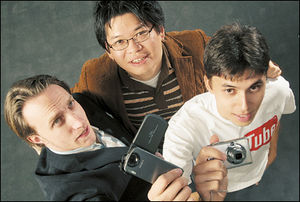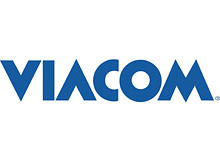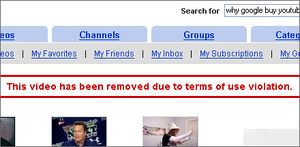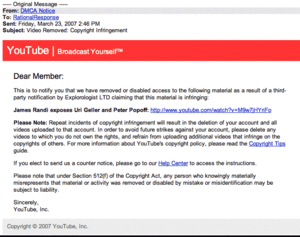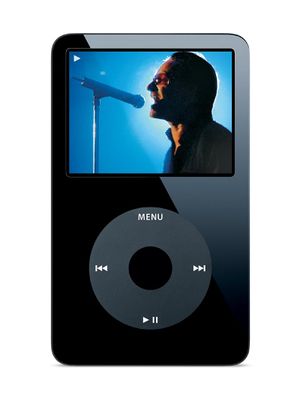Courses/Computer Science/CPSC 203/CPSC 203 2007Summer L60/CPSC 203 2007Summer L60 TermProjects/YouTube: Why Pay?
Contents
Project Information
- Group Name: TORBYO

- Group Members:
- Rebecca Cox
- Pam Red Gun
- Andy Wong
- Joyce Wong
Problem Statement
The creation of an original piece of work, as well as the purchase of those creations, is a unique process that must be protected through legal means, so that the author or owner can fully benefit from their works distribution. YouTube is a vastly used means of sharing information and is largely utilized as a free access to various forms of media. As one of the largest and most readily available sources of media sharing, Youtube presents an opportunity to infringe upon the copyright laws put in place to protect the creators and owners of media. Through this presentation, we will investigate who YouTube is, current legal standing, their future with copyright infringement as well as Internet copyright as a whole.
History
Who is YouTube?
YouYube was originally invented by Chad Hurley, Steve Chen, and Jawed Karim; three ex PayPal employees who were highly educated in computer science and design. Starting out of a garage as an office, YouTube is essentially video playback technology that allows for a video sharing website based on Macromedia's Flash Player 7. This small website company started on February 15, 2005 and grew quickly but it wasn't until the investment of venture capital firm Sequoia Capital, planting over $10 million into the new YouTube website that its popularity soared world wide. As the site's popularity increased, so did the threat of copyright infringement. It was a Saturday Night Live Skit that was posted on Youtube that brought publicity to the website. This forced YouTube to sign agreements with three major media companies to escape the threat of copyright infringement. On October 9th, 2006 after signing these agreements, the major web-based conglomerate Google bought and joined YouTube through $1.65 billion worth of stocks.
Internet Copyright
Copyrights on the internet have the same meaning as printed publications. Internet users have the right to protect artwork, music, and many other forms of expressions to prevent their work from being copied. The failure to comply to copyright can become a subject of plagiarism (Taking another person's words as your own). Once this occurs the owners of such creations have no right to report copyright infringement, because of the fact that the internet has no restricted boundaries. Individuals must copyright at the beginning of page setup before publishing artwork on the internet. Internet users must keep in mind the consequences of publishing artwork on the internet is a risk but there are a few things people can do to minimize copyright violations. Two helpful suggestions is to copyright and maintain original documents for proof of ownership.
According to United States copyright law, everything from April 1, 1989 is copyrighted by the owner or author whether it has a copyright notice or not (a copyright notice being a © or specific written notice). Users of the internet must imply that all internet material is copyrighted, unless specificed by the author. Only if the piece of work is granted to public domain can any internet user take, copy or use without crediting the author. A piece is only in the public domain and available for public use if the author explicitly states "I grant this to the public domain". Though owners of works can sue for damages when their work is used against copyright laws, violations are often passed unnoticed do to the sheer amount that happen every day.
YouTube's Legal Battles
YouTube is a constant target for copyright infringement lawsuits. Everyone from everyday users to media heavyweights have attempted to sue YouTube for various accounts of copyright infringement. Though YouTube has been taking hit after hit of copyright lawsuits, the users; who are the true culprits behind the infringement, are going by unscathed. Internet privacy laws and features are serving as protection from copyright holders and the only danger they are in is account termination from YouTube.
Viacom
A major lawsuit in YouTube's past, present and future is that of Viacom. Following the pulling of over 100,000 videos from YouTube, media giant Viacom; which owns MTV, Nickelodeon, Shockwave and Comedy Central among others, has sued YouTube for $1 billion, accusing YouTube of "massive intentional copyright infringement". Upon announcing their lawsuit, Viacomn issued a statement saying YouTube and Google are "continuting to take the fruit of our efforts without permission and destroying enormous value in the process".Currently, Viacom has not entered any official licensing agreement with YouTube similar to those with CBS, NBC and BBC among others (BBC had previously ordered YouTube to take down a number of videos off the site). There has been no new advancements in the Viacom vs YouTube lawsuit.
Who's To Blame?
YouTube's Current Stance
What Has Happened
Even though YouTube policy states that it does not allow content to be uploaded that is not permitted by the United States Copyright Law, infringing content is frequently uploaded by many users. Such things as television shows, commercials, music videos, and live concerts are not only easy to find and view on YouTube, but also present in large quantities. Though uploaded videos must have the permission of the copyright holder, with the immense amount of submitted videos, YouTube has a hard time policing and enforcing their policies and terms of use. Unless a copyright holder reports them directly, YouTube can only locate infringing videos through self policing. YouTube attempts to identify video content through any search terms associated with the clips, however, this is easily navigated around as users can simply use alternative search terms (such as misspelled names). For a brief time, members of the YouTube community could report others for copyright infringement but this method of policing was quickly deemed ineffective as some users were abusing the ability to report one another. For instance, some members were being reported by others merely out of spite or reasons not associated with terms of use violations.
What Is Happening
To deal with the increased number of copyright infringing material on their site, YouTube has come up with various measures to police the site and aid copyright owners in controlling where their material is distributed. For instance, the Content Verification Program was created to help copyright holders find and remove any material that may be in violation of copyright law. The program then provides YouTube with the information to locate the material and carry out the necessary measures. To obtain the program, copyright holding companies (for which the program was specifically designed) can apply for the tool by filling out a form and faxing it to YouTube directly. The form serves as an identification of authorized agents and acts as legal confirmation that the applicant is the holder of the copyright to the material.
Another way YouTube fights copyright infringement is with their Copyright Infringement Notification system. To notify YouTube of copyright infringement, the user is advised to consult legal counsel and confirm a list of requirements for the video to qualify as infringed content. If all qualifications are met, YouTube is then able to take action to both remove the content and deal with the user in question of infringement. Another way YouTube tries to prevent copyright infringement is provide information. YouTube provides many copyright tips (such as how to recognize if your submitted video is infringing copyright) and gives the issue of copyright a lot of attention, frequently bringing up the topic in the YouTube Code of Conduct, Terms of Use, and Policy.
Recently, Eric E. Schmidt, CEO of Google, announced that YouTube will soon be implementing a content filtering system to remove infringing content from the service. The new system, called "Claim Your Content", will automatically identify copyrighted material for removal.
Should a video be found guilty of copyright infringement, YouTube will take it down from the site. The user is notified and given an official warning. If the user is a frequent offender of infringement, YouTube will then have the user’s account terminated.
The Future of YouTube
The future of YouTube is uncertain. If YouTube does not enforcing copyright laws, it may soon be faced with numerious lawsuits forcing it to close down. However, on the flip side, YouTube can strike deals with companies looking to sue them by having mutually beneficial agreements. Partnerships with CBS, BBC, Universal Music Group, Sony Music Group, Warner Music Group, The NBA, and The Sundance Channel among others prove YouTube's attraction as an outlet for marketing opportunities. Some broadcasting companies, such as NBC even have their own YouTube user accounts to attract viewers.
It will almost be impossible to completely stop users from uploading copyrighted materials. If YouTube bans IP addresses of the uploaders, the uploaders can simply use a cellphone or laptop and hop onto any open Wi-Fi network and upload more videos. Banning accounts is ineffective as well because there is nothing stopping users from making new accounts.
Since Google owns YouTube, Google can use its search engine as 'leverage' by saying that companies that sue YouTube will no longer be supported by Google's search engine. Which could seriously reduce public knowledge about new products, services and technologies provided by the companies.
Recent Technology
Recently, Apple has announced that their new iPhone will support YouTube. In a way, allowing the iPhone to use YouTube has sent a message to consumers that copyright infringement is ok, this has displeased many companies looking to sue YouTube for copyright infringement. Although many people suspected that this would happen over Wi-Fi but Apple has stated that internet on the iPhone will be via EDGE. This has angered many consumers because EDGE is not as fast or convenient as Wi-Fi. Wi-Fi is also esentially 'free' but EDGE will cost consumers money to use.
Other cell phones that have the ability to access the internet can also access YouTube. Since earlier cell phones do not support Wi-Fi they need to use EDGE to use internet which may be economically unfeasible to stream YouTube videos from. Cellular companies such as Rogers charge $5 per month to use mobile internet with only 5mb included and $0.03 per KB downloaded after that. The largest video that that can be uploaded on YouTube is 100mb which means for somebody to watch that would cost them which means you would have to pay $3000 to watch that video if you used EDGE. There is a warning on YouTube mobile's website stating: "Information: YouTube Mobile is a data intensive application. We highly recommend that you upgrade to an unlimited data plan with your mobile service provider to avoid additional charges."
The Nintendo Wii has the ability to access the internet, now everybody that owns a Wii can watch YouTube on the comfort of their couch.
With the ever increasing popularity of YouTube and iPods, new technology has emerged. You can now download programs onto your computer which convert YouTube videos from their original format to an iPod compatible format, saving it to your computer and allowing you to input it into your iPod.
Conclusion
By being accessible on the internet, YouTube has made itself available world wide to millions of users and viewers. With so many users, and an enormous amount of videos, it is virtually impossible for YouTube to be able to police and remove all videos not in compliance with copyright laws. The manpower that would be needed in order to stay current with copyright infringement and the posting of copyrighted material is unimaginable. "Why Pay" implies the feeling of users to fail to pay for copyright licences and the lack of need for viewers to pay to watch paid programming online. Should YouTube hope to continue into the distant future, they will need to set up ways to not only recognize copyrighted content, but impose greater consequences for users in violation and defer heavy lawsuits to those who are truly responsible. YouTube is basically acting as a site where users can share their own media, however, they are being attacked again and again with copyright claims and although YouTube is presently doing as much as it can, to succeed further, changes will need to be made.
References
- Copyright on the Internet [Pierce Law]
- Copyright and Youtube [Royalty Free Music]
- YouTube[Google buys You Tube
- Legal Issues[Viacom Sues]
- Google Vs. Viacom on DMCA [Internetnews.com]
- Apple encourages YouTubeing? [CNET]
- YouTube: [| Copyright Infringement Notification]
- ZD Net News: [| YouTube Sued Over Copyright Infringement]
- Wikipedia: [| YouTube] #YouTube: [| About YouTube]
- YouTube: [| Content Verification Program]
Additional Resources
- Copyright on the Internet [Pierce Law]
- Youtube's Fate [ZDNet]
- Youtube Lawsuite [Law.Com]
- Copyright Your Website [Direct Legal]
- Dancing Video in Copyright War [NEWS]
- Copyright Protection Technology [Axcess News]
- How to Download Movies from Youtube [How To]
- Copyright and Youtube [Royalty Free Music]
- Untamed Copyright Frontier [Sci-Tech]
- Youtube Yanks Beyonce Fall [MTV]
- YouTube[Tube Traffic]
- Copyright [Copyright Tips]
- Copyrights[About Tube]
- YouTube[Google buys You Tube
- Legal Issues[Viacom Sues]
- You Tube[Video hazards]
- YouTube Favorites[Favorites]
- You Tube[House Owner Angers on B&E video]
- YouTube[Venice Project to Kill You Tube]
- You Tube[Parental Concerns]
- Google Vs. Viacom on DMCA [Internetnews.com]
- Apple encourages YouTubeing? [CNET]
- US Judge uses YouTube in court [The Register]
- Mark Cuban "YouTube is doomed" [InformationWeek]
- Guitar lessons yanked from YouTube by RIAA [ZeroPaid]
- Magician bent outta shape over YouTube video [Statesman]
- Sports & YouTube, copyright issues [Medill]
- If you can't beat 'em... join 'em [BusinessWeek]
- Telus has image scared by YouTube videos [The Tyee]
- One man Vs. YouTube [Esquire]
- YouTube: [| Copyright Infringement Notification]
- YouTube: [| Code of Conduct]
- YouTube: [| Copyright Tips]
- YouTube: [| Terms of Use]
- CNETNews.com: [| Google's YouTube Copyright Worries]
- Ars Technia: [| YouTube and the Copyright Cops: Safe...for now?]
- ZD Net News: [| YouTube Sued Over Copyright Infringement]
- ARS Technia: [| YouTube's Copyright Conundrum]
- YouTube: [| The Great YouTube Copyright Debate]
- TechDirt: [| And Here Come The YouTube Copyright Lawsuits]
- Guardian Unlimited: [| Google Faces Copyright Fight Over YouTube]
- Canadian Department of Justice: [| Canadian Copyright Act]
- Wikipedia: [| YouTube]
- YouTube: [| About YouTube]
- YouTube: [| Content Verification Program]

